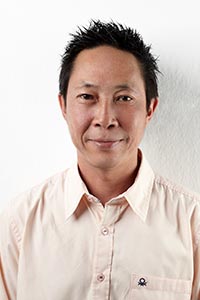
As time goes by, passengers on Thailand's meandering ship of state are slowly getting an idea of their final destination as decreed by the superstitious figure of "Pae" − a mythical Chinese river pilot of legendary status.

"Everyone is in the same boat. The old sayings dictate that we must follow Pae when on his boat, otherwise we will be kicked out by Pae," Deputy Prime Minister Wissanu Krea-ngam said on Nov 29.
The legal expert stopped short of identifying just who the government's "Pae the pilot" is in the present political context. But he added a teaser: "We have to understand what he wants us to do."
In the midst of this obliqueness, no one from the National Council for Peace and Order, the National Legislative Assembly, the Charter Drafting Assembly or the cabinet has given us any clue as to who this mysterious boatman Pae is. But it's no big deal. What matters is what Pae has in mind for us.
Of the 11 areas of reform being undertaken by the National Reform Council, none is more important than the section on politics, because it was the political mess that led to the street rallies, the violence, the coup and all that has happened since. The people responsible for reform and writing a new constitution are trying to find the medicine to ensure we are not revisited by the past.
One thing is for certain though: Political reforms of the past have gone around and returned to square one, again and again. Political doctors diagnosed that there were too many parties in parliament, blaming this for making the country politically unstable.
They wanted a strong political system like those found in Western countries, where only a handful of parties administer the country. That diagnosis led to a medicine called "the party-list formula". The idea was to give popular parties more chances for more seats, leading to stability in the House and politics in general.
Voters cast ballots for a candidate in their constituency and then for party-list candidates. They were free to vote as they wished in the two categories — but experience showed they tended to pick the same party both times.
The idea of having strong political parties — as opposed to small parties that need only a few seats to hold a sword over a coalition government — is not wrong. A strong winning party should be able to forge ahead with its promised policies and not be distracted by incessant lobbying from coalition parties or concern over stability in parliament.
Where it went wrong in the past was that charter writers did not expect to see somebody like Thaksin Shinawatra in politics. He and the following prime ministers who were backed by him benefited from this oversight. In fact, he outsmarted those charter drafters.
His strategy was full control of the lower house and a shut out of the opposition, so that his party, whatever name it was going by, could rule with absolute power.
This parliamentary "dictatorship" went too far, however, and ended up with the shameful amnesty bill attempt, which triggered street protests and brought in the army.
Pae the riverboat man is trying to correct this problem. It seems a strong party system might not fit with the Thai political context.
So several ideas have been floated by politicians, academics and reformists, including direct election of the prime minister, cabinet members and MPs. Most of the ideas show a preference for dilution of political parties in the House by doing anything they can to block one party from dominating. This is because of what the country has learned from the Thaksin era, especially the premiers backed by him in subsequent years.
Pae hopes that by diluting the political parties it will make it more difficult for a Thaksin-backed party to take an iron grip on the reins of power again.
There are advantages and disadvantages to having weak or strong political parties. No formula is perfect. Either could work — but only if the country has the "medicine" to encourage the right people to enter politics and screen out those who are unqualified.
Hopefully, Pae is steering his boat to the right destination so that the country does not have to seek his services again.
Saritdet Marukatat is digital media news editor, Bangkok Post.
